六年级英语下册Unit3学习资料
- 格式:ppt
- 大小:1.57 MB
- 文档页数:16
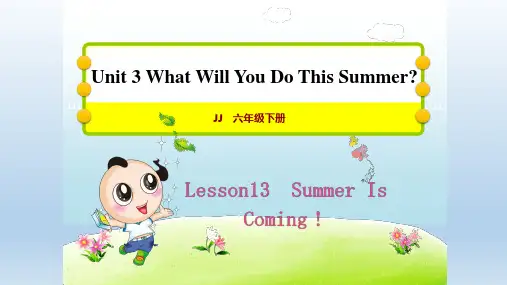

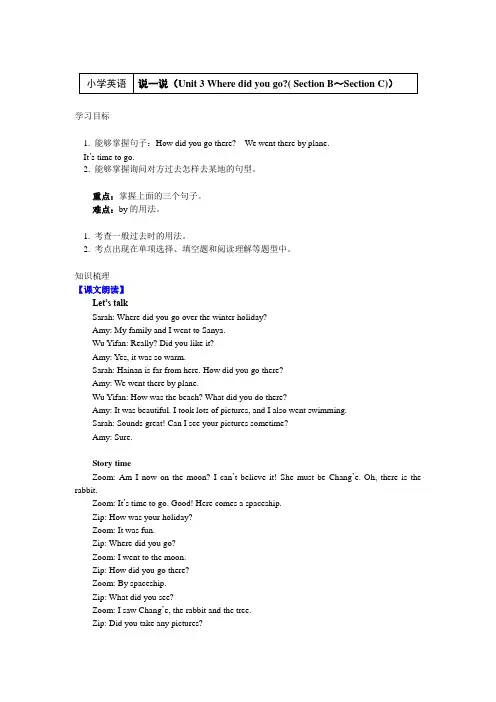
学习目标1. 能够掌握句子:How did you go there? We went there by plane.It’s time to go.2. 能够掌握询问对方过去怎样去某地的句型。
重点:掌握上面的三个句子。
难点:by的用法。
1. 考查一般过去时的用法。
2. 考点出现在单项选择、填空题和阅读理解等题型中。
知识梳理【课文朗读】Let’s talkSarah: Where did you go over the winter holiday?Amy: My family and I went to Sanya.Wu Yifan: Really? Did you like it?Amy: Yes, it was so warm.Sarah: Hainan is far from here. How did you go there?Amy: We went there by plane.Wu Yifan: How was the beach? What did you do there?Amy: It was beautiful. I took lots of pictures, and I also went swimming.Sarah: Sounds great! Can I see your pictures sometime?Amy: Sure.Story timeZoom: Am I now on the moon? I can’t believe it! She must be Chang’e. Oh, there is the rabbit.Zoom: It’s time to go. Good! Here comes a spaceship.Zip: How was your holiday?Zoom: It was fun.Zip: Where did you go?Zoom: I went to the moon.Zip: How did you go there?Zoom: By spaceship.Zip: What did you see?Zoom: I saw Chang’e, the rabbit and the tree.Zip: Did you take any pictures?Zoom: Yes, I did. Oops, where did I put the pictures?Zoom: Oh, it was a dream.【句子赏析】1. How did you go there? 你们怎么去那儿的?问句:How did +主语+go+其他?这个问句用来询问对方过去去某地的出行方式,用特殊疑问词how 提问。
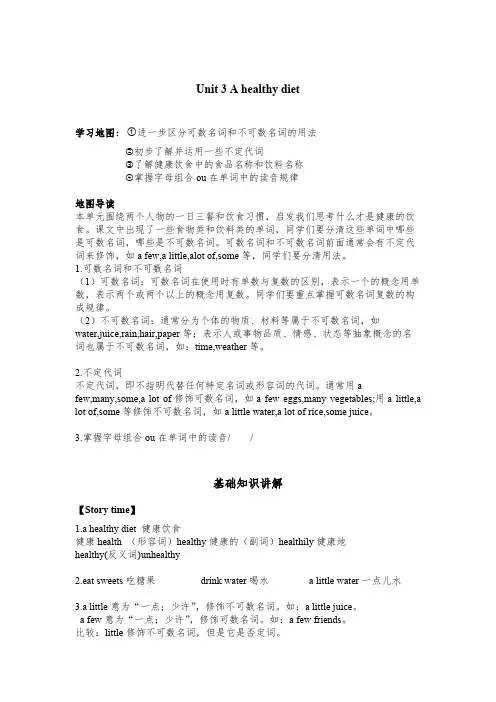
Unit 3 A healthy diet学习地图:①进一步区分可数名词和不可数名词的用法②初步了解并运用一些不定代词③了解健康饮食中的食品名称和饮料名称④掌握字母组合ou在单词中的读音规律地图导读本单元围绕两个人物的一日三餐和饮食习惯,启发我们思考什么才是健康的饮食。
课文中出现了一些食物类和饮料类的单词,同学们要分清这些单词中哪些是可数名词,哪些是不可数名词。
可数名词和不可数名词前面通常会有不定代词来修饰,如a few,a little,alot of,some等,同学们要分清用法。
1.可数名词和不可数名词(1)可数名词:可数名词在使用时有单数与复数的区别,表示一个的概念用单数,表示两个或两个以上的概念用复数。
同学们要重点掌握可数名词复数的构成规律。
(2)不可数名词:通常分为个体的物质、材料等属于不可数名词,如water,juice,rain,hair,paper等;表示人或事物品质、情感、状态等抽象概念的名词也属于不可数名词,如:time,weather等。
2.不定代词不定代词,即不指明代替任何特定名词或形容词的代词。
通常用afew,many,some,a lot of修饰可数名词,如a few eggs,many vegetables;用a little,a lot of,some等修饰不可数名词,如a little water,a lot of rice,some juice。
3.掌握字母组合ou在单词中的读音/ /基础知识讲解【Story time】1.a healthy diet 健康饮食健康health (形容词)healthy健康的(副词)healthily健康地healthy(反义词)unhealthy2.eat sweets吃糖果drink water喝水 a little water一点儿水3.a little意为“一点;少许”,修饰不可数名词。
如:a little juice。
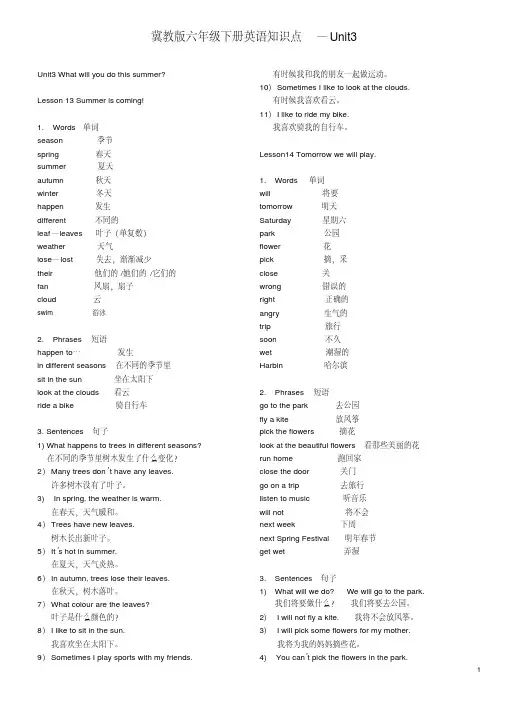
Unit3 What will you do this summer?Lesson 13 Summer is coming!1.Words 单词season 季节spring 春天summer 夏天autumn 秋天winter 冬天happen 发生different 不同的leaf—leaves 叶子(单复数)weather 天气lose—lost 失去,渐渐减少their 他们的/她们的/它们的fan 风扇,扇子cloud 云swim 游泳2.Phrases 短语happen to…发生in different seasons 在不同的季节里sit in the sun 坐在太阳下look at the clouds 看云ride a bike 骑自行车3. Sentences 句子1) What happens to trees in different seasons?在不同的季节里树木发生了什么变化?2)Many trees don’t have any leaves.许多树木没有了叶子。
3) In spring, the weather is warm.在春天,天气暖和。
4)Trees have new leaves.树木长出新叶子。
5)It’s hot in summer.在夏天,天气炎热。
6)In autumn, trees lose their leaves.在秋天,树木落叶。
7)What colour are the leaves?叶子是什么颜色的?8)I like to sit in the sun.我喜欢坐在太阳下。
9)Sometimes I play sports with my friends.有时候我和我的朋友一起做运动。
10)Sometimes I like to look at the clouds.有时候我喜欢看云。
11)I like to ride my bike.我喜欢骑我的自行车。
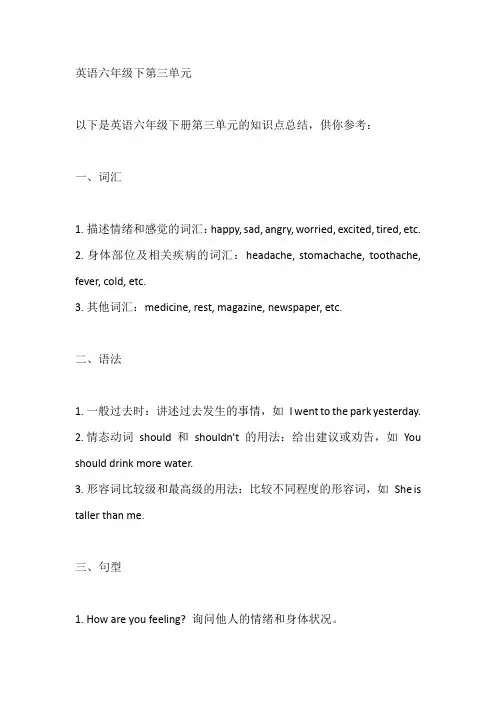
英语六年级下第三单元
以下是英语六年级下册第三单元的知识点总结,供你参考:
一、词汇
1.描述情绪和感觉的词汇:happy, sad, angry, worried, excited, tired, etc.
2.身体部位及相关疾病的词汇:headache, stomachache, toothache, fever, cold, etc.
3.其他词汇:medicine, rest, magazine, newspaper, etc.
二、语法
1.一般过去时:讲述过去发生的事情,如I went to the park yesterday.
2.情态动词should 和shouldn't 的用法:给出建议或劝告,如You should drink more water.
3.形容词比较级和最高级的用法:比较不同程度的形容词,如She is taller than me.
三、句型
1.How are you feeling? 询问他人的情绪和身体状况。
2.What's the matter? 用于询问他人的问题或困扰。
3.I'm sorry to hear that. 表达对他人困扰的同情和关心。
四、阅读理解
1.理解故事和文章中的主要情节和人物情感。
2.提取关键信息,回答问题。
五、写作
1.描述自己或他人的情绪和身体状况。
2.写关于健康生活方式的建议。
以上是第三单元的主要知识点总结,但请注意不同教材版本可能会有所差异。
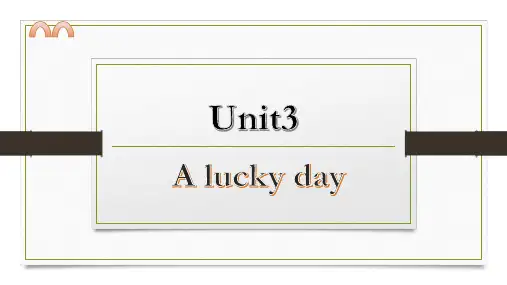
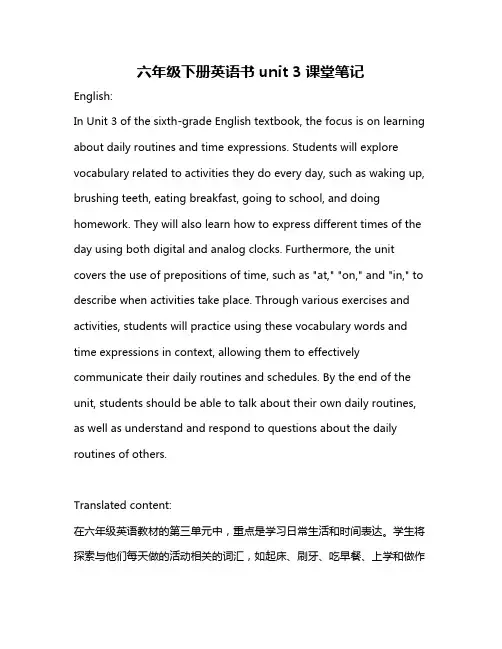
六年级下册英语书unit 3课堂笔记English:In Unit 3 of the sixth-grade English textbook, the focus is on learning about daily routines and time expressions. Students will explore vocabulary related to activities they do every day, such as waking up, brushing teeth, eating breakfast, going to school, and doing homework. They will also learn how to express different times of the day using both digital and analog clocks. Furthermore, the unit covers the use of prepositions of time, such as "at," "on," and "in," to describe when activities take place. Through various exercises and activities, students will practice using these vocabulary words and time expressions in context, allowing them to effectively communicate their daily routines and schedules. By the end of the unit, students should be able to talk about their own daily routines, as well as understand and respond to questions about the daily routines of others.Translated content:在六年级英语教材的第三单元中,重点是学习日常生活和时间表达。
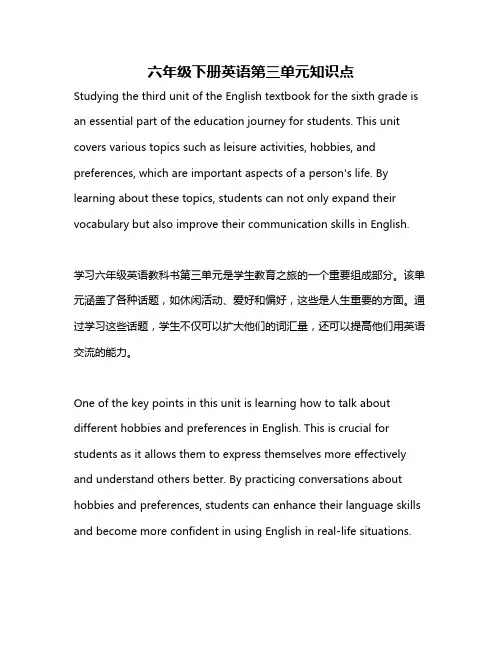
六年级下册英语第三单元知识点Studying the third unit of the English textbook for the sixth grade is an essential part of the education journey for students. This unit covers various topics such as leisure activities, hobbies, and preferences, which are important aspects of a person's life. By learning about these topics, students can not only expand their vocabulary but also improve their communication skills in English.学习六年级英语教科书第三单元是学生教育之旅的一个重要组成部分。
该单元涵盖了各种话题,如休闲活动、爱好和偏好,这些是人生重要的方面。
通过学习这些话题,学生不仅可以扩大他们的词汇量,还可以提高他们用英语交流的能力。
One of the key points in this unit is learning how to talk about different hobbies and preferences in English. This is crucial for students as it allows them to express themselves more effectively and understand others better. By practicing conversations about hobbies and preferences, students can enhance their language skills and become more confident in using English in real-life situations.该单元的一个重点是学习如何用英语谈论不同的爱好和偏好。
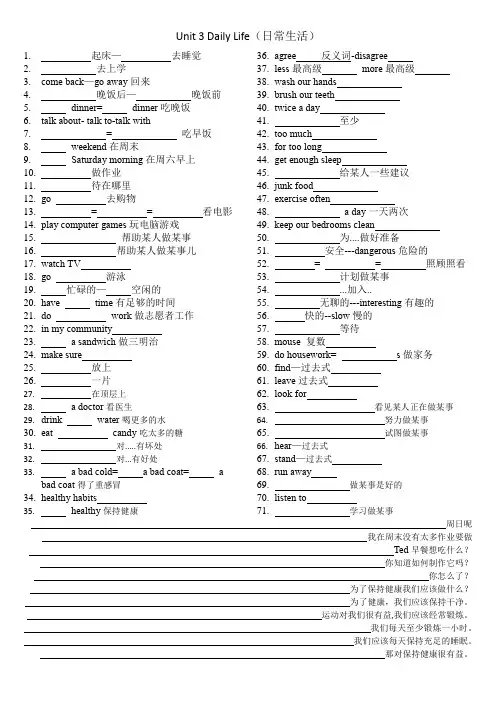
Unit 3 Daily Life(日常生活)1.起床—去睡觉2.去上学e back—go away回来4.晚饭后—晚饭前5.dinner= dinner吃晚饭6.talk about- talk to-talk with7.= 吃早饭8.weekend在周末9.Saturday morning在周六早上10.做作业11.待在哪里12.go 去购物13.= = 看电影14.play computer games玩电脑游戏15.帮助某人做某事16.帮助某人做某事儿17.watch TV18.go 游泳19.忙碌的—空闲的20.have time有足够的时间21.do work做志愿者工作22.in my community23. a sandwich做三明治24.make sure25.放上26.一片27.在顶层上28. a doctor看医生29.drink water喝更多的水30.eat candy吃太多的糖31.对.....有坏处32.对...有好处33. a bad cold= a bad coat= abad coat得了重感冒34.healthy habits35.healthy保持健康36.agree 反义词-disagree37.less最高级more最高级38.wash our hands39.brush our teeth40.twice a day41.至少42.too much43.for too long44.get enough sleep45.给某人一些建议46.junk food47.exercise often48. a day一天两次49.keep our bedrooms clean50.为....做好准备51.安全---dangerous危险的52.= = 照顾照看53.计划做某事54....加入..55.无聊的---interesting有趣的56.快的--slow慢的57.等待58.mouse 复数59.do housework= s做家务60.find—过去式61.leave过去式62.look for63.看见某人正在做某事64.努力做某事65.试图做某事66.hear—过去式67.stand—过去式68.run away69.做某事是好的70.listen to71.学习做某事周日呢我在周末没有太多作业要做Ted早餐想吃什么?你知道如何制作它吗?你怎么了?为了保持健康我们应该做什么?为了健康,我们应该保持干净。
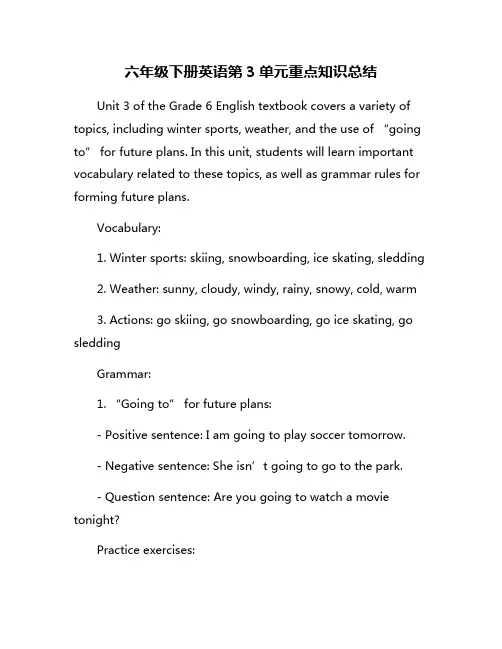
六年级下册英语第3单元重点知识总结Unit 3 of the Grade 6 English textbook covers a variety of topics, including winter sports, weather, and the use of “going to” for future plans. In this unit, students will learn important vocabulary related to these topics, as well as grammar rules for forming future plans.Vocabulary:1. Winter sports: skiing, snowboarding, ice skating, sledding2. Weather: sunny, cloudy, windy, rainy, snowy, cold, warm3. Actions: go skiing, go snowboarding, go ice skating, go sleddingGrammar:1. “Going to” for future plans:- Positive sentence: I am going to play soccer tomorrow.- Negative sentence: She isn’t going to go to the park.- Question sentence: Are you going to watch a movie tonight?Practice exercises:1. Fill in the blanks with the correct form of “going to”:- I ________ visit my grandma next weekend.- They __________ eat dinner at a restaurant tonight.- She ____________ buy a new dress for the party.2. Write sentences using the vocabulary words:- I love going snowboarding in the winter.- The weather is warm and sunny today.- Are you going ice skating with us tomorrow?Listening and speaking practice:1. Listen to a conversation between two friends making plans for the weekend. Answer questions about their plans.2. Have a class discussion about favorite winter sports and weather preferences. Encourage students to ask each other questions using “going to.”Reading comprehension:1. Read a passage about a fami ly’s winter vacation and answer questions about their activities and the weather.2. Write a short paragraph about a future plan using “going to.”Unit 3 is an important part of the Grade 6 English curriculum, as it introduces students to vocabulary and grammar structures that they will continue to use throughout their English learning journey. By mastering the vocabulary and grammar in this unit, students will be better equipped to communicate about winter sports, weather, and future plans in English.。
六年级下册英语三单元知识总结In this unit, we learned vocabulary related to family members and family activities. We understood the importance of family and how they support and love us. Here are some key points:1. Family Members:- Father: The male parent in a family.- Mother: The female parent in a family.- Brother: A male sibling.- Sister: A female sibling.- Grandfather: The father of one's father or mother.- Grandmother: The mother of one's father or mother.2. Family Activities:- Eating Together: Families often gather around the table to share meals.- Playing Together: Enjoying activities like board games, cards, or sports together.- Going Out Together: Going for walks, picnics, or outings as a family.- Helping Each Other: Supporting and assisting family members in daily tasks.3. Family Relationships:- Love and Care: Family members show affection, care, and concern for each other.- Trust: Family members rely on and have confidence in one another.- Support: Providing emotional and practical support during both good and bad times.- Communication: Family members talk and share their thoughts, feelings, and experiences.4. Popular Expressions:- "Blood is thicker than water": Family bonds are stronger than other relationships.- "Like father, like son": Similarities between fathers and sons in terms of behavior or appearance.- "A shoulder to lean on": Someone who provides support and empathy in difficult times.Unit 4: HobbiesIn Unit 4, we explored various hobbies and leisure activities. We learned new vocabulary and expressions related to different hobbies. Here's what we covered:1. Hobbies and Leisure Activities:- Reading: Engaging in books, magazines, or newspapersfor enjoyment.- Drawing: Creating artworks using pencils, pens, or colors.- Dancing: Moving rhythmically to music for pleasure or performance.- Singing: Using the voice to produce musical sounds and melodies.- Playing Musical Instruments: Learning and playing instruments like the piano, guitar, or drums.2. Talking About Hobbies:- I like/love/enjoy + [verb + -ing]: Expressing preferences for specific activities.- My hobby is + [noun]: Describing one's main hobby or interest.- What's your hobby? / Do you have any hobbies?: Asking about someone's hobbies.- How often do you...?: Inquiring about the frequency of engaging in a hobby.3. Discovering New Hobbies:- Trying Different Activities: Exploring new hobbies to find what interests us.- Joining Clubs or Classes: Participating in group activities related to a specific hobby.- Watching Others: Observing and learning from experts or enthusiasts in a particular hobby.4. Sharing Interests:- Talking with Others: Engaging in conversations with friends or family about hobbies.- Showing Achievements: Displaying artworks, musical performances, or other creations.Remember, hobbies are important for relaxation, self-expression, and personal growth. They can also be a great wayto meet new people and make friends who share similar interests.。
Wheredidyougo六年级英语下册Unit3知识点情景是教师创设或模拟的生活场景,应具有真实、生动、实用的特点,下面是小偏整理的Wheredidyougo六年级英语下册Unit3知识点,感谢您的每一次阅读。
Wheredidyougo六年级英语下册Unit3知识点【重点词汇】gofishing---wentfishing去钓鱼gocamping---wentcamping 去野营goswimming---wentswimming去游泳rideabike---rodeabike 骑自行车rideahorse---rodeahorse骑马hurtmyfoot---hurtmyfoot我的脚受伤takepictures---tookpictures照相buygifts---boughtgifts买礼物eatfreshfood---atefreshfood吃新鲜的食物falloff---felloff从…摔倒licked(lick的过去式)舔could(can的过去式)能及其过去式laughed(laugh的过去式)笑【重点语法】▶一般疑问句,把did提前—Didyouhelpyourparentscleantheroom?(当句子变为一般疑问句,动词应还原)—Yes,Idid./No,Ididn’t.▶特殊疑问句:疑问词+did+主语+V原形+其它?1.—Wheredidyougoonyourholiday?假期你去了哪里?—IwenttoXinjiang.我去了新疆.2.—Whatdidyoudoonyourholiday?你假期干了什么?—Isanganddanced.我即唱了歌又跳了舞.3.—Howdidyougothere?你怎样去的?—Iwentbytrain.我坐火车去的.4.—Whendidyougo?你什么时候去的?—IwentlastMonday.我上周一去的.【重点句型】1.---Whathappened?--Ifelloffmybikeandhurtmyfoot.怎么了?我从自行车上摔下来了,并且弄伤了我的脚。
Unit 3 A healthy diet【知识点】1. a healthy diet 一个健康的饮食习惯an unhealthy diet 一个不健康的饮食习惯health n. 健康healthy adj. 健康的keep healthy 保持健康diet dieted/ dieting on diet 减肥,节食【练习】 a healthy diet【health 和healthy的相互转化】(1)【易错】He shouldn’t drink socola , or he’ll beA. much;unhealthyB. a lot of ;healthyC. many;unhealthy(2)【易错】Everyone should keep.A.healthyB. healthilyC.health(3)【易错】Our(health) is the most important.(最重要)2. Mike has some bread and milk for breakfast. Mike早餐吃一些面包和牛奶。
have …. for breakfast/ lunch/ dinner 早/午/晚饭吃…..bread , milk 不可数名词drink water/milk 喝水/牛奶都可以用have来表示吃喝eat some fish and meat 吃一些鱼和肉【练习】like后用动名词likes eating sweets(1)【易错】Do you wanta glass of water?A. eatB. drinkC. haveD./(2)Mike doesn’t like(drink) water.三餐类前for的用法【for翻译成“当做”】(1)I eat a few noodles _______.A. in dinnerB. of dinnerC. for dinner(2)我爷爷每天早餐吃一些面包和土豆。
Unit 3 Daily Life(日常生活)一、单元词汇volunteer 志愿者sandwich 三明治top 上边,上面habit 习惯idea 主意,想法;意见less 更少at least 至少二、单元句型(一)周末生活1. A: Bill, what do you do on weekends in China?比尔,你在中国周末做什么?B: On Saturday mornings, I always go to my maths club.周六早上,我通常去数学社团。
B: On Saturday afternoons, I often stay at home and do my homework. 周六下午,我经常在家做作业。
B: Sometimes I go shopping or go to the cinema with my mum. 有时我去购物或者和妈妈一起看电影。
B: Wow, you re so busy on weekends! 哇,你周末好忙!(二)保持健康的建议What should we do to keep healthy? What are your ideas?我们应该怎样保持健康呢?你们有什么想法?We shouldn t eat them every day. 我们不该每天吃它们。
We should eat more fruit and vegetables, and less meat and candy.我们应该吃更多水果和蔬菜,少吃肉和糖。
To be healthy, we should also keep clean: wash our hands before eating and brush our teeth twice a day.为了健康,我们应该保持干净:饭前洗手,每天刷两次牙。
We should also exercise often. 我们还应该经常锻炼。
六年级下册英语第三单元的知识点
1. 词汇和短语:这一单元学生将学习一些与食物、餐厅和
点餐相关的词汇和短语,如菜单、点餐、餐具、食物名称、饮
料等。
2. 语法和句子结构:这一单元学生将学习一般现在时的基
本句型和动词第三人称单数的用法,如He/She eats an apple every day. They play basketball every Saturday.
3. 阅读理解:学生将学习如何阅读和理解菜单和点餐相关
的对话,理解餐厅中点餐的流程和礼仪。
4. 写作:学生将学习如何写一份餐厅点餐的对话,包括看
菜单、点菜、确认菜品和饮料等环节。
5. 听力和口语:学生将通过听力练习和口语活动学习如何
正确地发音和朗读与食物、餐厅和点餐相关的句子。
6. 文化知识:学生将了解一些不同国家的饮食文化和礼仪,如用手抓饭、使用刀叉等。
通过这些知识点的学习,学生将能够更好地理解和掌握英语在日常生活中的应用,提高语言技能和交际能力。
— 1 —。
Unit3单词healthy 健康的diet 饮食a little 一点a few 几个at a time 一次cola 可乐need 需要重点内容知识点精析1.a few, a little, a lot of 和 some 的意义和用法有所不同,让我们来看一看下面的表格:(1) a few 几个,修饯可数名词复数例句:I have a few friends. 我有几个朋友。
(2) a little 一点,后面常接不可数名词。
例句:There is a little water in the bottle. 瓶子里有一点水。
(3) a lot of 很多,大量,既可以修饯可数名词复数,又可以修饯不可数名词。
例句:There are a lot of trees on the hill. 山上有很多树。
(3)some 一些,常用在肯定句中,既可以修饯可数名词复数,又可以修饯不可数名词。
例句:I want some books. 我想要一些书。
2.可数名词与不可数名词名词可以分为可数名词和不可数名词。
可数名词:可以用数目来计算的名词。
可数名词有单数形式和复数形式;不可数名词:一般无法用数目来计算的名词。
(1)可数名词单数变复数的规则变化:① 一般情况下在词尾加sdesk desks 书桌map maps 地图penpens 钢笔girlgirls 女孩② 以 s,x,ch,sh 结尾的词在词尾加esclass classes 班级boxboxes 盒子peachpeaches 桃子③ 以辅音字母加 y 结尾的词先变 y 为 i,再加esfactory factories 工厂baby babies 婴儿familyfamilies 家庭city cities 城市④ 以元音字母加 y 结尾的词在词尾加sdaydays 天boyboys 男孩keykeys 钥匙⑤ 以 f 戒 fe 结尾的词变 f 戒 fe 为 v, 再加 esknife knives 刀wifewives 妻子leafleaves 叶子life lives生命⑥ 以辅音字母加 o 结尾且表示有生命的事物的词,一般在词尾加es potato potatoes 土豆tomato tomatoes 西红柿hero heroes 英雄⑦ 以元音字母加 o 结尾且表示无生命的事物的词, 一般在词尾加s radioradios 收音机zoozoos 动物园(2)有些名词复数形式的变化是不规则的。